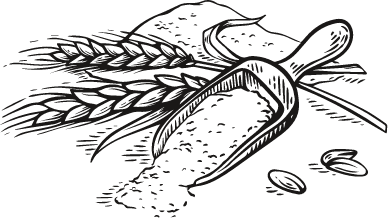What are Omega-3 fatty acids ?
Lipids (or fats) have been present in our diet for thousand years and for good reason: they are essential. Nervous system, cardiovascular system, hormonal balance, quality of the skin and mucous membranes ... In short, without lipids, the body and cells are not functional, essential amino acids and fat-soluble vitamins (A, D, E, K …) are not assimilated.
The different fatty acids (fats) are:
- Polyunsaturated fatty acids: omega-3, omega-6, they are said to be "essential" because the body does not know how to produce them
- Monounsaturated fatty acids: omega-9
- Trans fatty acids: that is, converted, they should be kept as low as possible: their excess consumption can be harmful for the body and they are not nutritionally essential

The omega-6 and omega-3 duo
The important thing to understand is that in an "ideal" nutritional balance, our plate should consist of one omega-3 to five omega-6 ratios. This equation ensures a subtle balance for our health. However, today in Europe, our plate contains one omega-3 for ... twenty-five omega-6! Involved? Our modern diet where it is much harder to find those precious omega-3 !
These essential omega-3 fatty acids embody health and longevity : they are much more easily found in Inuit’s diets or on the famous island of Okinawa, known for its high number of centenarians.
What are the consequences of an excess of omega-6 fatty acids in our diet?
An excess of omega-6 in our diet, however healthy they may be, can weaken our body. By competing with the absorption of omega-3s, they can lead to so-called "low-grade" inflammation, weaken the intestinal barrier or even create skin and cognitive problems ...
Health Benefits of Omega-3 Fatty Acids
- Protection of the cardiovascular system
- Regulation of blood pressure and cholesterol
- Good skin health: eczema, atopic skin, stretch marks… and our mucous membranes: intestinal porosity, bowel syndrome, intimate discomfort…
- Balance of the nervous system: stress, anxiety, cognition, learning ...
Did you know ?
There are two kinds of omega-3s:
- Vegetable omega-3s (alpha-linoleic acid)
- Animal omega-3s (eicosapentaenoic acid called EPA and docosahexaenoic acid called DHA)
Remember: vegetable omega-3s must first be transformed in order to be assimilated (up to about 15%).
Focus on benefits of DHA omega-3
Omega-3 DHA acts on our overall health both physically and mentally.
- protective at the cardiovascular level
- healthy skin and mucous membranes
- prevention and action on cognition and mental well-being: Alzheimer's, nervous balance, stress, anxiety, exam period ...
- antioxidant action for the body
- pregnancy and post-partum, both for the mother and for her child: a DHA intake is particularly appreciable in the 3rd trimester, when the fetal brain has its most important growth
How do you add omega-3s to your meals ?
The WHO recommends a daily intake of at least 250 mg of EPA / DHA per day or 1 g of ALA to be adjusted according to eating habits, age, sports activity, etc.
To reach this quota in our modern diet, supplementation several times a year may be necessary, over a minimum of 3 months. With several possibilities : linseed oil or chia oil capsules, fish oil or krill oil capsules.
To get your fill of omega-3s, add to your diet every day :
- Organic vegetable oils of first cold pressing : flax, rapeseed, camelina, perilla, hemp, chia… Please note, vegetable oils rich in omega-3 are very fragile, they should be consumed cold and ideally stored in the refrigerator
- Avocado
- Walnut kernels
- Chia seeds
- Flax seeds (ground to be more digestible)
- Hulled hemp seeds
- Small fatty fish: sardines, mackerel… and wild salmon
- Algae: Crypthecodinium cohnii and Schizochytrium sp
A few “omega-3” habits that are easy to adopt !
- Make your salad dressing with half olive oil / half rapeseed oil or 100% rapeseed
- Add to your smoothie or at the last moment on your plate 1 teaspoon of linseed, camelina or hemp oil
- A handful of fresh or dried nuts as a snack or in your dish
- 2 contributions of fatty fish per week, ideally organic and with the mention "natural"
Breakfast recipe idea : banana chia pudding
- 1 natural vegetable or sheep yogurt
- 1 tbsp of chia seeds
- 1 banana
- 1 teaspoon of cocoa powder
- 1 teaspoon of linseed oil
- Option: 1 tablespoon of chocolate chips
The day before, mix the yogurt with the chia seeds and cocoa in a bowl and possibly the chocolate chips. Add the sliced banana on top. The next morning, add the linseed oil and enjoy with a hot drink.
Quick meal recipe idea : mackerel toast with walnuts
- 2 slices of whole meal bread / rye / spelt
- 1 fillet of mackerel in its natural state
- 1 half garlic clove
- Raw butter or margarine
- Nut oil
- Unlimited fresh herbs: dill, parsley, chives, coriander ...
- Green salad
- Option: some crushed walnuts
Rub bread with fresh garlic or mash some on top. Spread with butter then add the crumbled mackerel. Add a drizzle of walnut oil, the chopped herbs and a few pieces of crushed walnuts. Serve with a green salad or vegetable soup.
Snack idea : an assortment of seeds and oleaginous to go with your break of the day!
- ¼ walnut kernels
- ¼ hulled hemp seeds
- ¼ of whole almonds
- ¼ unsalted pistachio nuts
- Option: add some dried fruits (grapes, cranberries, etc.)
Mix the ingredients in a glass jar fitted with a seal (Le Parfait jar type). Enjoy a handful of the mixture, possibly accompanied by fruit for a nomadic and gourmet snack suitable for the whole family!









